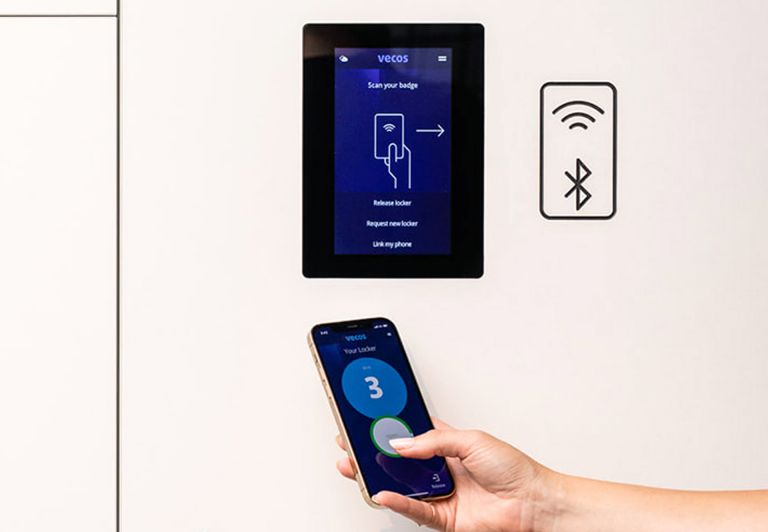Across the 3,500m2 space, JLL cleverly manufactured each of its three floors to serve as a distinct destination, with careful consideration around how colleagues on different levels would interact.
Level 25, where the bulk of the workforce is located, houses a dense work zone with 285 desks and various collaboration zones, including booth seating and spaces for focus work. Level 26 features a large kitchen and breakout areas where employees come together for lunch and casual meetings. It’s also where the town hall is located, a space for large gatherings becoming prevalent in modern workplaces. As the client floor, Level 27 takes on a hospitality approach rather than that of a typical office. It has a large board room and presentation suite with casual lounge seating, as well as a reception desk attended full time.
Aside from the physical space, JLL's design team examined how experience can forge connection. The team took learnings from its previous office, which, located over three floors with three separate kitchens, made the likelihood of chance encounters slim. Additions like beer taps and an on-site barista now promote interaction across all service streams, leading to unexpected collaborations and conversations around value-add opportunities for clients.
Head of project development services (NSW), Anthony Meola explains, “When going up for a coffee in the morning I frequently bump into people from across the business. That leads to a conversation which leads to a client opportunity which leads to a project. We can now do business development in-house and provide a better service to the market because our new workplace makes us so well connected."
From lighting to lockers to hybrid working, technology was a driving factor in the new space. To support the 80% of meetings which are either hybrid or online, JLL invested heavily in internet connection, AV set up and lighting to ensure people look their best on calls. Shared Vecos smart lockers, built with Schiavello joinery, allow staff to access lockers when needed using only their swipe cards or an app. Throughout shared spaces, automatic lighting alerts employees to when rooms are in use, providing convenience when impromptu phone calls require somewhere quiet to talk. To meet this requirement, Schiavello customised each Phone Room with a visual indicator to show when it’s in use.
It was these Phone Rooms that were a key driver in JLL selecting Schiavello as a furniture partner. Aside from the Rooms being a product of Australia, they ticked all necessary boxes from a sustainability standpoint. Lead designer, Leanne explains, “Our project is Platinum WELL and Green Star Certified, so there were strict sustainability objectives we had to meet. We did a lot of research on companies with exceptional sustainability practices, which ruled out most suppliers. Schiavello was able to provide a range of options that met JLL's sustainability criteria, including phone rooms made in Victoria that meet all the certification requirements.”
The design team went as far as to source materials for the build that were either recycled, recyclable or could be returned to the supplier for reuse. This includes acoustic panelling made from recycled plastic bottles, a rammed earth reception counter constructed from Australian soil and carpets that can have their yarns taken off and reused.
To fulfil an important requirement for adequate meeting rooms, JLL's fit-out prioritises flexible workspaces through furniture, operable walls and dual purpose rooms. Schiavello’s Aire Fold Tables, which can be folded and moved, provide agility in meeting rooms, while operable walls allow the office to easily transform to accommodate gatherings of all sizes. A podcasting and media room converts into a standard meeting room, while the lunchroom doubles as an impromptu collaboration space outside peak hours. By weaving versatility into every facet of the fit-out, the full spectrum of work styles and tasks - including individual assignments, collaborative projects and casual meetings - is supported.
As for the future of JLL’s workspace, Anthony says, “We’re living it. Post-covid, businesses need to provide better technology and an environment that balances different work styles, fosters in-person collaboration, and gives people a reason to come in.”
Leanne adds that, “Collaboration is paramount, so if businesses want to move into their future workplace, they need less work points and more collaboration zones.”
The overarching message from real estate experts, JLL, is that it’s not just about the physical environment, it’s about the entire employee experience on any given workday; a philosophy that will benefit its clients for many years to come.
Featured Products

Vecos Smart Storage

Krossi Table

Focus Quiet Phone Room






